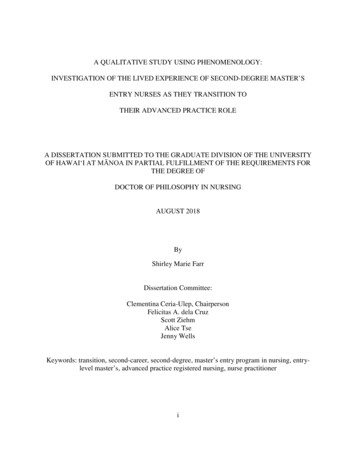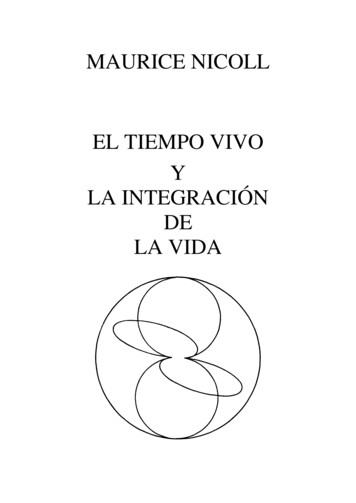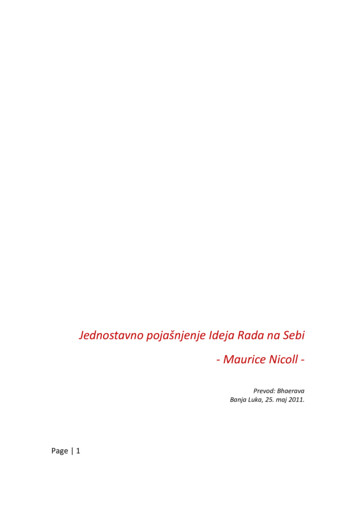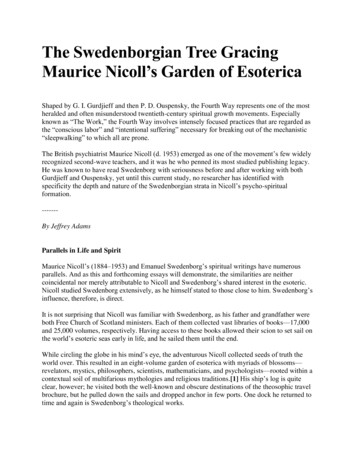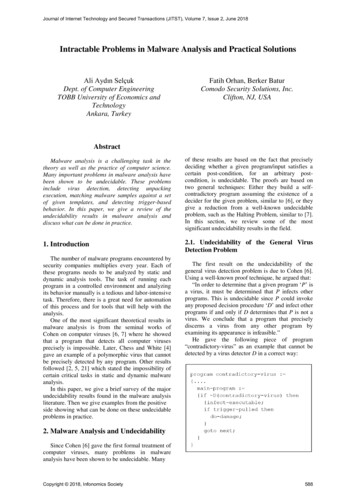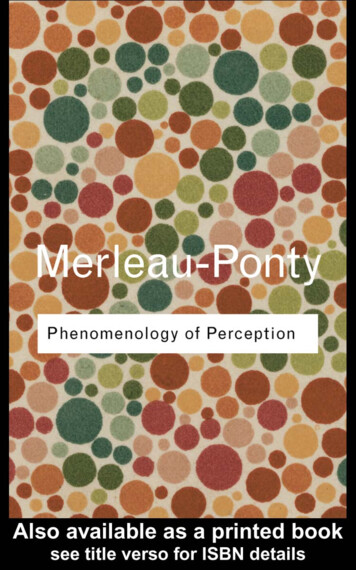
Transcription
Phenomenology of Percept ion‘In this text, the body-organism is linked to the worldthrough a network of primal significations, which arisefrom the perception of things.’Michel Foucault‘We live in an age of tele-presence and virtual reality.The sciences of the mind are finally paying heed to thecentrality of body and world. Everything around usdrives home the intimacy of perception, action andthought. In this emerging nexus, the work of MerleauPonty has never been more timely, or had more to teachus . . . The Phenomenology of Perception covers all thebases, from simple perception-action routines to thefull Monty of conciousness, reason and the elusive self.Essential reading for anyone who cares about theembodied mind.’Andy Clark, Professor of Philosophy and Director ofthe Cognitive Science Program, Indiana University
MauriceMerleau-PontyPhenomenology of PerceptionTranslated by Colin SmithLondon and New York
Phénomènologie de la perception published 1945by Gallimard, ParisEnglish edition first published 1962by Routledge & Kegan PaulFirst published in Routledge Classics 2002by Routledge11 New Fetter Lane, London EC4P 4EE29 West 35th Street, New York, NY 10001Routledge is an imprint of the Taylor & Francis GroupThis edition published in the Taylor and Francis e-Library, 2005.“To purchase your own copy of this or any of Taylor & Francis or Routledge’scollection of thousands of eBooks please go to www.eBookstore.tandf.co.uk.” 1945 Editions GallimardTranslation 1958 Routledge & Kegan PaulAll rights reserved. No part of this book may be reprintedor reproduced or utilised in any form or by any electronic,mechanical, or other means, now known or hereafterinvented, including photocopying and recording, or inany information storage or retrieval system, withoutpermission in writing from the publishers.British Library Cataloguing in Publication DataA catalogue record for this book is available from the British LibraryLibrary of Congress Cataloging in Publication DataA catalog record for this book has been requestedISBN 0-203-99461-2 Master e-book ISBNISBN 0–415–27840–6 (hbk)ISBN 0–415–27841–4 (pbk)
C ONTENTSPrefaceviiINTRODUCTION Traditional Prejudices and theReturn to Phenomena1234The ‘Sensation’ as a Unit of Experience‘Association’ and the ‘Projection of Memories’‘Attention’ and ‘Judgement’The Phenomenal Field3153060PART I The Body123456Experience and Objective Thought. The Problem ofthe BodyThe Body as Object and Mechanistic PhysiologyThe Experience of the Body and Classical PsychologyThe Spatiality of One’s own Body and MotilityThe Synthesis of One’s own BodyThe Body in its Sexual BeingThe Body as Expression, and Speech7784103112171178202
vicontentsPART II The World as Perceived1234The Theory of the Body is already a Theoryof PerceptionSense ExperienceSpaceThe Thing and the Natural WorldOther Selves and the Human World235240283348403PART III Being-for-Itself and Being-in-the-World123The 531539
P REFACEWhat is phenomenology? It may seem strange that this question hasstill to be asked half a century after the first works of Husserl. Thefact remains that it has by no means been answered. Phenomenologyis the study of essences; and according to it, all problems amount tofinding definitions of essences: the essence of perception, or theessence of consciousness, for example. But phenomenology is also aphilosophy which puts essences back into existence, and does notexpect to arrive at an understanding of man and the world from anystarting point other than that of their ‘facticity’. It is a transcendentalphilosophy which places in abeyance the assertions arising out ofthe natural attitude, the better to understand them; but it is also aphilosophy for which the world is always ‘already there’ beforereflection begins—as ’an inalienable presence; and all its efforts areconcentrated upon re-achieving a direct and primitive contact withthe world, and endowing that contact with a philosophical status. It isthe search for a philosophy which shall be a ‘rigorous science’, butit also offers an account of space, time and the world as we ‘live’them. It tries to give a direct description of our experience as it is,without taking account of its psychological origin and the causalexplanations which the scientist, the historian or the sociologist maybe able to provide. Yet Husserl in his last works mentions a ‘genetic
viii prefacephenomenology’,1 and even a ‘constructive phenomenology’.2 Onemay try to do away with these contradictions by making a distinction between Husserl’s and Heidegger’s phenomenologies; yet thewhole of Sein und Zeit springs from an indication given by Husserland amounts to no more than an explicit account of the ‘natürlicherWeltbegriff ’ or the ‘Lebenswelt’ which Husserl, towards the endof his life, identified as the central theme of phenomenology,with the result that the contradiction reappears in Husserl’s ownphilosophy. The reader pressed for time will be inclined to give up theidea of covering a doctrine which says everything, and will wonderwhether a philosophy which cannot define its scope deserves all thediscussion which has gone on around it, and whether he is not facedrather by a myth or a fashion.Even if this were the case, there would still be a need to understandthe prestige of the myth and the origin of the fashion, and the opinionof the responsible philosopher must be that phenomenology can be practisedand identified as a manner or style of thinking, that it existed as a movement beforearriving at complete awareness of itself as a philosophy. It has been long on theway, and its adherents have discovered it in every quarter, certainly inHegel and Kierkegaard, but equally in Marx, Nietzsche and Freud. Apurely linguistic examination of the texts in question would yield noproof; we find in texts only what we put into them, and if ever any kindof history has suggested the interpretations which should be put on it,it is the history of philosophy. We shall find in ourselves, and nowhereelse, the unity and true meaning of phenomenology. It is less a question of counting up quotations than of determining and expressing inconcrete form this phenomenology for ourselves which has given a number ofpresent-day readers the impression, on reading Husserl or Heidegger,not so much of encountering a new philosophy as of recognizing whatthey had been waiting for. Phenomenology is accessible only through aphenomenological method. Let us, therefore, try systematically tobring together the celebrated phenomenological themes as they havegrown spontaneously together in life. Perhaps we shall then understandMéditations cartésiennes, pp. 120 ff.See the unpublished 6th Méditation cartésienne, edited by Eugen Fink, to which G.Berger has kindly referred us.12
prefacewhy phenomenology has for so long remained at an initial stage, as aproblem to be solved and a hope to be realized.It is a matter of describing, not of explaining or analysing. Husserl’sfirst directive to phenomenology, in its early stages, to be a ‘descriptivepsychology’, or to return to the ‘things themselves’, is from the start aforeswearing of science. I am not the outcome or the meeting-point ofnumerous causal agencies which determine my bodily or psychological make-up. I cannot conceive myself as nothing but a bit of theworld, a mere object of biological, psychological or sociologicalinvestigation. I cannot shut myself up within the realm of science. Allmy knowledge of the world, even my scientific knowledge, is gainedfrom my own particular point of view, or from some experience of theworld without which the symbols of science would be meaningless.The whole universe of science is built upon the world as directlyexperienced, and if we want to subject science itself to rigorous scrutiny and arrive at a precise assessment of its meaning and scope, wemust begin by reawakening the basic experience of the world of whichscience is the second-order expression. Science has not and never willhave, by its nature, the same significance qua form of being as the worldwhich we perceive, for the simple reason that it is a rationale or explanation of that world. I am, not a ‘living creature’ nor even a ‘man’, noragain even ‘a consciousness’ endowed with all the characteristicswhich zoology, social anatomy or inductive psychology recognize inthese various products of the natural or historical process—I am theabsolute source, my existence does not stem from my antecedents,from my physical and social environment; instead it moves out towardsthem and sustains them, for I alone bring into being for myself (andtherefore into being in the only sense that the word can have for me)the tradition which I elect to carry on, or the horizon whose distancefrom me would be abolished—since that distance is not one of itsproperties—if I were not there to scan it with my gaze. Scientific pointsof view, according to which my existence is a moment of the world’s,are always both naïve and at the same time dishonest, because they takefor granted, without explicitly mentioning, it, the other point of view,namely that of consciousness, through which from the outset a worldforms itself round me and begins to exist for me. To return to thingsix
xprefacethemselves is to return to that world which precedes knowledge, ofwhich knowledge always speaks, and in relation to which every scientificschematization is an abstract and derivative sign-language, as isgeography in relation to the country-side in which we have learntbeforehand what a forest, a prairie or a river is.This move is absolutely distinct from the idealist return to consciousness, and the demand for a pure description excludes equally theprocedure of analytical reflection on the one hand, and that of scientificexplanation on the other. Descartes and particularly Kant detached thesubject, or consciousness, by showing that I could not possibly apprehend anything as existing unless I first of all experienced myself asexisting in the act of apprehending it. They presented consciousness,the absolute certainty of my existence for myself, as the condition ofthere being anything at all; and the act of relating as the basis ofrelatedness. It is true that the act of relating is nothing if divorced fromthe spectacle of the world in which relations are found; the unity ofconsciousness in Kant is achieved simultaneously with that of theworld. And in Descartes methodical doubt does not deprive us of anything, since the whole world, at least in so far as we experience it, isreinstated in the Cogito, enjoying equal certainty, and simply labelled‘thought of . . . But the relations between subject and world are notstrictly bilateral: if they were, the certainty of the world would, inDescartes, be immediately given with that of the Cogito, and Kant wouldnot have talked about his ‘Copernican revolution’. Analytical reflectionstarts from our experience of the world and goes back to the subject asto a condition of possibility distinct from that experience, revealing theall-embracing synthesis as that without which there would be noworld. To this extent it ceases to remain part of our experience andoffers, in place of an account, a reconstruction. It is understandable, inview of this, that Husserl, having accused Kant of adopting a ‘facultypsychologism’,3 should have urged, in place of a noetic analysis whichbases the world on the synthesizing activity of the subject, his own‘noematic reflection’ which remains within the object and, instead ofbegetting it, brings to light its fundamental unity.The world is there before any possible analysis of mine, and it would3Logische Untersuchungen, Prolegomena zur reinen Logik, p. 93.
prefacebe artificial to make it the outcome of a series of syntheses which link,in the first place sensations, then aspects of the object corresponding todifferent perspectives, when both are nothing but products of analysis,with no sort of prior reality. Analytical reflection believes that it cantrace back the course followed by a prior constituting act and arrive, inthe ‘inner man’—to use Saint Augustine’s expression—at a constituting power which has always been identical with that inner self. Thusreflection is carried off by itself and installs itself in an impregnablesubjectivity, as yet untouched by being and time. But this is veryingenuous, or at least it is an incomplete form of reflection which losessight of its own beginning. When I begin to reflect my reflection bearsupon an unreflective experience; moreover my reflection cannot beunaware of itself as an event, and so it appears to itself in the light of atruly creative act, of a changed structure of consciousness, and yet ithas to recognize, as having priority over its own operations, the worldwhich is given to the subject because the subject is given to himself.The real has to be described, not constructed or formed. Which meansthat I cannot put perception into the same category as the synthesesrepresented by judgements, acts or predications. My field of perceptionis constantly filled with a play of colours, noises and fleeting tactilesensations which I cannot relate precisely to the context of my clearlyperceived world, yet which I nevertheless immediately ‘place’ in theworld, without ever confusing them with my daydreams. Equally constantly I weave dreams round things. I imagine people and thingswhose presence is not incompatible with the context, yet who are notin fact involved in it: they are ahead of reality, in the realm of theimaginary. If the reality of my perception were based solely on theintrinsic coherence of ‘representations’, it ought to be for ever hesitantand, being wrapped up in my conjectures on probabilities. I ought tobe ceaselessly taking apart misleading syntheses, and reinstating inreality stray phenomena which I had excluded in the first place. But thisdoes not happen. The real is a closely woven fabric. It does not awaitour judgement before incorporating the most surprising phenomena,or before rejecting the most plausible figments of our imagination.Perception is not a science of the world, it is not even an act, a deliberate taking up of a position; it is the background from which all actsstand out, and is presupposed by them. The world is not an object suchxi
xiiprefacethat I have in my possession the law of its making; it is the naturalsetting of, and field for, all my thoughts and all my explicit perceptions.Truth does not ‘inhabit’ only ‘the inner man’,4 or more accurately,there is no inner man, man is in the world, and only in the world doeshe know himself. When I return to myself from an excursion into therealm of dogmatic common sense or of science, I find, not a source ofintrinsic truth, but a subject destined to the world.All of which reveals the true meaning of the famous phenomenological reduction. There is probably no question over which Husserlspent more time—or to which he more often returned, since the‘problematic of reduction’ occupies an important place in hisunpublished work. For a long time, and even in recent texts, the reduction is presented as the return to a transcendental consciousness beforewhich the world is spread out and completely transparent, quickenedthrough and through by a series of apperceptions which it is the philosopher’s task to reconstitute on the basis of their outcome. Thus mysensation of redness is perceived as the manifestation of a certain rednessexperienced, this in turn as the manifestation of a red surface, which isthe manifestation of a piece of red cardboard, and this finally is themanifestation or outline of a red thing, namely this book. We are tounderstand, then, that it is the apprehension of a certain hylè, as indicating a phenomenon of a higher degree, the Sinngebung, or activemeaning-giving operation which may be said to define consciousness,so that the world is nothing but ‘world-as-meaning’, and the phenomenological reduction is idealistic, in the sense that there is here atranscendental idealism which treats the world as an indivisible unityof value shared by Peter and Paul, in which their perspectives blend.‘Peter’s consciousness’ and ‘Paul’s consciousness’ are in communication, the perception of the world ‘by Peter’ is not Peter’s doing anymore than its perception ‘by Paul’ is Paul’s doing; in each case it is thedoing of pre-personal forms of consciousness, whose communicationraises no problem, since it is demanded by the very definition of consciousness, meaning or truth. In so far as I am a consciousness, that is,in so far as something has meaning for me, I am neither here nor there,4In te redi; in interiore homine habitat veritas (Saint Augustine).
prefaceneither Peter nor Paul; I am in no way distinguishable from an ‘other’consciousness, since we are immediately in touch with the world andsince the world is, by definition, unique, being the system in which alltruths cohere. A logically consistent transcendental idealism rids theworld of its opacity and its transcendence. The world is precisely thatthing of which we form a representation, not as men or as empiricalsubjects, but in so far as we are all one light and participate in the Onewithout destroying its unity. Analytical reflection knows nothing of theproblem of other minds, or of that of the world, because it insists thatwith the first glimmer of consciousness there appears in me theoretically the power of reaching some universal truth, and that the otherperson, being equally without thisness, location or body, the Alter andthe Ego are one and the same in the true world which is the unifier ofminds. There is no difficulty in understanding how I can conceive theOther, because the I and consequently the Other are not conceived aspart of the woven stuff of phenomena; they have validity rather thanexistence. There is nothing hidden behind these faces and gestures, nodomain to which I have no access, merely a little shadow which owesits very existence to the light. For Husserl, on the contrary, it is wellknown that there is a problem of other people, and the alter ego is aparadox. If the other is truly for himself alone, beyond his being forme, and if we are for each other and not both for God, we mustnecessarily have some appearance for each other. He must and I musthave an outer appearance, and there must be, besides the perspective ofthe For Oneself—my view of myself and the other’s of himself—aperspective of For Others—my view of others and theirs of me. Ofcourse, these two perspectives, in each one of us, cannot be simplyjuxtaposed, for in that case it is not I that the other would see, nor he that I should see.I must be the exterior that I present to others, and the body of the othermust be the other himself. This paradox and the dialectic of the Egoand the Alter are possible only provided that the Ego and the Alter Egoare defined by their situation and are not freed from all inherence; thatis, provided that philosophy does not culminate in a return to the self,and that I discover by reflection not only my presence to myself, butalso the possibility of an ‘outside spectator’; that is, again, provided thatat the very moment when I experience my existence—at the ultimateextremity of reflection—I fall short of the ultimate density whichxiii
xiv prefacewould place me outside time, and that I discover within myself akind of internal weakness standing in the way of my being totallyindividualized: a weakness which exposes me to the gaze of others as aman among men or at least as a consciousness among consciousness.Hitherto the Cogito depreciated the perception of others, teaching me asit did that the I is accessible only to itself, since it defined me as thethought which I have of myself, and which clearly I am alone in having,at least in this ultimate sense. For the ‘other’ to be more than an emptyword, it is necessary that my existence should never be reduced to mybare awareness of existing, but that it should take in also the awarenessthat one may have of it, and thus include my incarnation in some natureand the possibility, at least, of a historical situation. The Cogito mustreveal me in a situation, and it is on this condition alone that transcendental subjectivity can, as Husserl puts it,5 be an intersubjectivity. As ameditating Ego, I can clearly distinguish from myself the world andthings, since I certainly do not exist in the way in which things exist. Imust even set aside from myself my body understood as a thing amongthings, as a collection of physico-chemical processes. But even if thecogitatio, which I thus discover, is without location in objective time andspace, it is not without place in the phenomenological world. Theworld, which I distinguished from myself as the totality of things or ofprocesses linked by causal relationships, I rediscover ‘in me’ as thepermanent horizon of all my cogitationes and as a dimension in relationto which I am constantly situating myself. The true Cogito does notdefine the subject’s existence in terms of the thought he has of existing,and furthermore does not convert the indubitability of the world intothe indubitability of thought about the world, nor finally does itreplace the world itself by the world as meaning. On the contrary itrecognizes my thought itself as an inalienable fact, and does away withany kind of idealism in revealing me as ‘being-in-the-world’.It is because we are through and through compounded of relationships with the world that for us the only way to become aware of thefact is to suspend the resultant activity, to refuse it our complicity (tolook at it ohne mitzumachen, as Husserl often says), or yet again, to put it‘out of play’. Not because we reject the certainties of common sense5Die Krisis der europäischen Wissenschaften und die transzendentale Phänomenologie, III (unpublished).
prefaceand a natural attitude to things—they are, on the contrary, the constanttheme of philosophy—but because, being the presupposed basis of anythought, they are taken for granted, and go unnoticed, and because inorder to arouse them and bring them to view, we have to suspend for amoment our recognition of them. The best formulation of the reduction is probably that given by Eugen Fink, Husserl’s assistant, when hespoke of ‘wonder’ in the face of the world.6 Reflection does notwithdraw from the world towards the unity of consciousness as theworld’s basis; it steps back to watch the forms of transcendence fly uplike sparks from a fire; it slackens the intentional threads which attachus to the world and thus brings them to our notice; it alone is consciousness of the world because it reveals that world as strange andparadoxical. Husserl’s transcendental is not Kant’s and Husserl accusesKant’s philosophy of being ‘worldly’, because it makes use of our relation to the world, which is the motive force of the transcendentaldeduction, and makes the world immanent in the subject, instead ofbeing filled with wonder at it and conceiving the subject as a process oftranscendence towards the world. All the misunderstandings with hisinterpreters, with the existentialist ‘dissidents’ and finally with himself, have arisen from the fact that in order to see the world and graspit as paradoxical, we must break with our familiar acceptance of itand, also, from the fact that from this break we can learn nothing butthe unmotivated upsurge of the world. The most important lessonwhich the reduction teaches us is the impossibility of a completereduction. This is why Husserl is constantly re-examining the possibility of the reduction. If we were absolute mind, the reduction wouldpresent no problem. But since, on the contrary, we are in the world,since indeed our reflections are carried out in the temporal flux onthe which we are trying to seize (since they sich einströmen, as Husserlsays), there is no thought which embraces all our thought. The philosopher, as the unpublished works declare, is a perpetual beginner,which means that he takes for granted nothing that men, learned orotherwise, believe they know. It means also that philosophy itself mustnot take itself for granted, in so far as it may have managed to saysomething true; that it is an ever-renewed experiment in making its6Die phänomenologische Philosophie Edmund Husserls in der gegenwärtigen Kritik, pp. 331 and ff.xv
xvi prefaceown beginning; that it consists wholly in the description of thisbeginning, and finally, that radical reflection amounts to a consciousness of its own dependence on an unreflective life which is its initialsituation, unchanging, given once and for all. Far from being, as hasbeen thought, a procedure of idealistic philosophy, phenomenological reduction belongs to existential philosophy: Heidegger’s‘being-in-the-world’ appears only against the background of thephenomenological reduction.A misunderstanding of a similar kind confuses the notion of the‘essences’ in Husserl. Every reduction, says Husserl, as well as beingtranscendental is necessarily eidetic. That means that we cannot subjectour perception of the world to philosophical scrutiny without ceasingto be identified with that act of positing the world, with that interest init which delimits us, without drawing back from our commitmentwhich is itself thus made to appear as a spectacle, without passing fromthe fact of our existence to its nature, from the Dasein to the Wesen. But itis clear that the essence is here not the end, but a means, that oureffective involvement in the world is precisely what has to be understood and made amenable to conceptualization, for it is what polarizesall our conceptual particularizations. The need to proceed by way ofessences does not mean that philosophy takes them as its object, but,on the contrary, that our existence is too tightly held in the world to beable to know itself as such at the moment of its involvement, and that itrequires the field of ideality in order to become acquainted with and toprevail over its facticity. The Vienna Circle, as is well known, lays itdown categorically that we can enter into relations only with meanings. For example, ‘consciousness’ is not for the Vienna Circle identifiable with what we are. It is a complex meaning which has developedlate in time, which should be handled with care, and only after themany meanings which have contributed, throughout the word’ssemantic development, to the formation of its present one have beenmade explicit. Logical positivism of this kind is the antithesis ofHusserl’s thought. Whatever the subtle changes of meaning whichhave ultimately brought us, as a linguistic acquisition, the word andconcept of consciousness, we enjoy direct access to what it designates.For we have the experience of ourselves, of that consciousness which
prefacewe are, and it is on the basis of this experience that all linguisticconnotations are assessed, and precisely through it that language comesto have any meaning at all for us. ‘It is that as yet dumb experience . . .which we are concerned to lead to the pure expression of its ownmeaning.’7 Husserl’s essences are destined to bring back all the livingrelationships of experience, as the fisherman’s net draws up from thedepths of the ocean quivering fish and seaweed. Jean Wahl is thereforewrong in saying that ‘Husserl separates essences from existence’.8 Theseparated essences are those of language. It is the office of language tocause essences to exist in a state of separation which is in fact merelyapparent, since through language they still rest upon the antepredicative life of consciousness. In the silence of primary consciousness can be seen appearing not only what words mean, but also whatthings mean: the core of primary meaning round which the acts ofnaming and expression take shape.Seeking the essence of consciousness will therefore not consist indeveloping the Wortbedeutung of consciousness and escaping from existence into the universe of things said; it will consist in rediscovering myactual presence to myself, the fact of my consciousness which is in thelast resort what the word and the concept of consciousness mean.Looking for the world’s essence is not looking for what it is as an ideaonce it has been reduced to a theme of discourse; it is looking for whatit is as a fact for us, before any thematization. Sensationalism ‘reduces’the world by noting that after all we never experience anything butstates of ourselves. Transcendental idealism too ‘reduces’ the worldsince, in so far as it guarantees the world, it does so by regarding it asthought or consciousness of the world, and as the mere correlative ofour knowledge, with the result that it becomes immanent in consciousness and the aseity of things is thereby done away with. Theeidetic reduction is, on the other hand, the determination to bring theworld to light as it is before any falling back on ourselves has occurred,it is the ambition to make reflection emulate the unreflective life ofconsciousness. I aim at and perceive a world. If I said, as do the sensationalists, that we have here only ‘states of consciousness’, and if I tried78Méditations cartésiennes, p. 33.Réalisme, dialectique et mystère, l’Arbalète, Autumn, 1942, unpaginated.xvii
xviii prefaceto distinguish my perceptions from my dreams with the aid of ‘criteria’, I should overlook the phenomenon of the world. For if I am ableto talk about ‘dreams’ and ‘reality’, to bother my head about thedistinction between imaginary and real, and cast doubt upon the ‘real’,it is because this distinction is already made by me before any analysis;it is because I have an experience of the real as of the imaginary, andthe problem then becomes one not of asking how critical thought canprovide for itself secondary equivalents of this distinction, but of making explicit our primordial knowledge of the ‘real’, of describing ourperception of the world as that upon which our idea of truth is foreverbased. We must not, therefore,
world. And in Descartes methodical doubt does not deprive us of any-thing, since the whole world, at least in so far as we experience it, is reinstated in the Cogito, enjoying equal certainty, and simply labelled ‘thought of . . . But the relations between subject and world are not strictl
